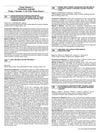S1 Opioid Receptor Agonists and Serum Prostate-Specific Antigen Level: Is There a Role for Prostate Cancer Control and Chemoprevention?
September 2010
in “
European Urology Supplements
”

TLDR Opioid use may lower PSA levels, suggesting a possible role in prostate cancer control; PSA testing is useful for detecting prostate cancer; serum triglycerides are not linked to prostate cancer risk; and higher urethral PSA levels may be associated with local hormone activity.
The document presents findings from several studies related to prostate cancer, with a focus on the role of opioid receptor agonists, the reliability of prostate-specific antigen (PSA) testing, the association between serum triglyceride levels and prostate cancer risk, and the measurement of urethral PSA levels after radical prostatectomy.
In the first study, a case-control study of 29 opium users and 39 non-users in an Iranian population found a significant association between opium consumption and lower serum PSA levels, suggesting a potential role for opioids in prostate cancer control. The mean serum PSA level was 0.91±0.87 ng/dL in opium users compared to 1.7±0.91 ng/dL in controls (p<0.001).
The second study evaluated the positive predictive value of PSA testing in 358 men undergoing prostate biopsies. It found that the positive predictive value of total serum PSA was 51.4%, and there was a significant association between PSA levels, PSA density, and the presence of prostate cancer. The study recommended the use of PSA testing for detecting malignant prostate lesions, suggesting that increasing the number of biopsy cores and using transrectal ultrasound (TRUS) could improve diagnostic accuracy.
The third study, a prospective multicenter case-control study with 194 prostate cancer cases and 317 controls, found no significant association between serum triglyceride levels and prostate cancer risk, challenging the hypothesis that triglycerides are involved in prostate cancer pathogenesis.
Lastly, a study of 45 patients after radical prostatectomy reported that higher urethral PSA (urPSA) levels were associated with higher androgenic alopecia scores and higher postoperative PSA levels, indicating a possible link between local dihydrotestosterone activity and PSA secretion.
Overall, these studies contribute to the understanding of factors associated with prostate cancer risk and the utility of PSA testing in diagnosis and postoperative monitoring.




